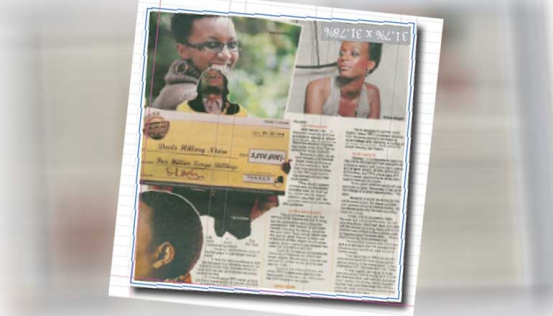
Pulse’s cover story of Friday, December 13, 2013, gave us a lowdown on the winners of East Africa’s premier reality TV music show, Tusker Project Fame (TPF).
Pulse’s post-mortem came at a time when Hope Irakoze had just become the first Burundian contestant to win TPF the previous Sunday night, in an event that was televised across the region.
“Lying prostrate on the podium as the entire region shares his moment of glory, Hope Irakoze looked lost and taken in disbelief,” Esther Muchene wrote.
“On his side stood a dejected Kenyan duo of Amos and Josh, the two Kenyans who had been tipped to win the contest only to be announced the first runner up.”
Hope went with the wind. Amos and Josh have since cemented their presence on the music scene. In TPF, the number twos seemed to be giving the number ones a real number two.
Cue in Peter Msechu, Patricia Kihoro, Hemedi Suleiman, Nakaaya Sumari, Debarl Aineah, Alvin Gatitu, Juvenalis Amonde and Bernard “Ng’ang’alito” Ng’ang’a.
Seemed like winning TPF was a “poisoned mic”.
Winners went home with the recording deal, cash prize, tons of publicity and high hopes, but also got what Pulse called the “curse of number one”.
To an extent, the only exception was TPF’s inaugural winner, Valerie Kimani. “She took the coveted prize home in 2006, and somewhat achieved some success considering she released an album titled, Baisikeli in 2007.
She starred in MTV’s miniseries Shuga.”
TPF2 winner, Ugandan, Esther Mugizi promised to release an album. Man, if we were still holding our breath for it, we’d be long dead from asphyxiation. Alpha Rwirangira, who won the TPF3 in 2009, kicked up a storm in TPF’s beer mug.
“The sponsor makes a lot of money from the project, but it doesn’t support the winners in return,” a furious Alpha is quoted to have said. “Most of the former winners are still struggling to make a name in the music industry.”
Then there was Davis Ntare, TPF4 winner. The bad boy, post-TPF. He was locked up at the Central Police Station in Nairobi, after allegedly biting the thumb of a female patron.
“The singer continued to get bad publicity with allegations that he had impregnated a Ugandan artiste, Zahara Toto. It was actually after these news came out that he relocated to Kenya.”
TPF5 winner, Ruth Matete hasn’t fared better than her predecessors. But she saw TPF differently. “It is a good platform and it will help one build a career. Personally, it has given me mileage and great opportunities.”
You can say that again.
Like we used to say in my old ‘hood, Jerih-Lumush: “Mbuyu, ukisha piga mawaba, unaenda kukaukia lembe”. Which is to say that, after taking a bath, you go and dry yourself elsewhere. Which means that ... heck, read between the lines.
Let’s cut TPF some slack. It’s a platform. Period. And it’s up to one to either turn it into a springboard or spring bed.
 The Standard Group Plc is a multi-media organization with investments in media
platforms spanning newspaper print
operations, television, radio broadcasting, digital and online services. The
Standard Group is recognized as a
leading multi-media house in Kenya with a key influence in matters of national and
international interest.
The Standard Group Plc is a multi-media organization with investments in media
platforms spanning newspaper print
operations, television, radio broadcasting, digital and online services. The
Standard Group is recognized as a
leading multi-media house in Kenya with a key influence in matters of national and
international interest.









